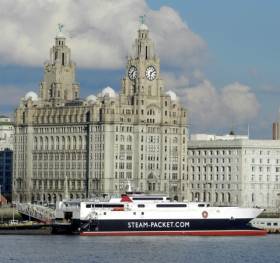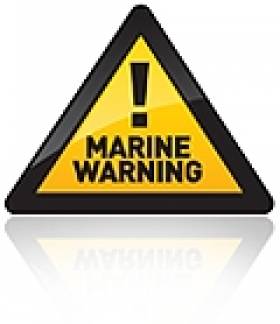Displaying items by tag: Works
#Liverpool - Essential works to be carried out at the Liverpool landing stage costing £540,000 has been agreed by the Isle fo Man Steam Packet Company so to safeguard services to the city for three more seasons.
The major investment is necessary to ensure that fast craft services can continue to operate between Douglas and the heart of Liverpool until the end of 2019, when a new berth will be required.
The contract to use the landing stage at Princes Parade was originally due to expire on 31st December 2016 and owner Peel Ports had indicated Steam Packet Company operations would need to relocate elsewhere. The landing stage was described as ‘time expired’ and too old to maintain but, following a request from the Steam Packet Company, Peel Ports reviewed the condition of the landing stage and identified its lifespan could be extended by three years if extensive essential works are carried out later this year.
As part of the three-year contract extension the Steam Packet Company has agreed to reimburse Peel Ports for the works, which will cost £540,000, securing the popular city centre berth until the end of Manannan’s 2019 season.
There will be no request for the Isle of Man Government to contribute and passenger fares will not be increased to pay for the investment. Scheduled services will not be disrupted when the required remedial works are carried out.
Steam Packet Company Chief Executive Mark Woodward said: ‘The future of the existing landing stage has been in doubt for some time, so we are pleased to be able to give our passengers certainty, at least in the short term.
‘As a business with its sole focus on providing services for the Isle of Man, we know that maintaining a Liverpool route is vitally important to many people in the Island as well as to developing the visitor market. We have now secured an immediate solution, but new facilities will be required longer term.
‘While we may have preferred to remain at Princes Parade, as it is a central location which is convenient for passengers, that is not viable longer term as Liverpool City Council wants to create a dedicated cruise terminal in this area, preventing our services berthing there.
‘Birkenhead 12 Quays, used by Ben-my-Chree during the winter, is not suitable for fast craft, there are currently no other Merseyside berths available and using the Liverpool Dock system would add about 45 minutes to journey time, negating the benefits of a fast craft service.’
He continued: ‘In 2016 Tynwald agreed the Department of Infrastructure could purchase land at Prince’s Half-Tide Dock with a view to creating a berth there. That facility will take time to complete, but our significant investment to retain the current landing stage for a further three years gives Isle of Man Government the time necessary for a long-term solution to be delivered.’
Marine Notice: Kinsale Pier Extension
#MarineNotice - Cork County Council is due to commence a 15-metre extension of the Town Pier in Kinsale in Co Cork.
The works are due to take place from this week till early December 2013, and will comprise the excavation of the sea bed from a pontoon barge (barge to be confirmed) for the installation of a mass concrete base and pier walls (15m x 30m).
Divers will be deployed throughout the underwater works. Hydrographic surveying will be carried out at intermittent stages throughout the works. Buoys will be deployed to mark the works area around the pier.
The commercial berth and north berth of the pier will remain operational throughout the works.
For further details of the works area see Marine Notice No 21 of 2013, a PDF of which is available to read or download HERE.






























































